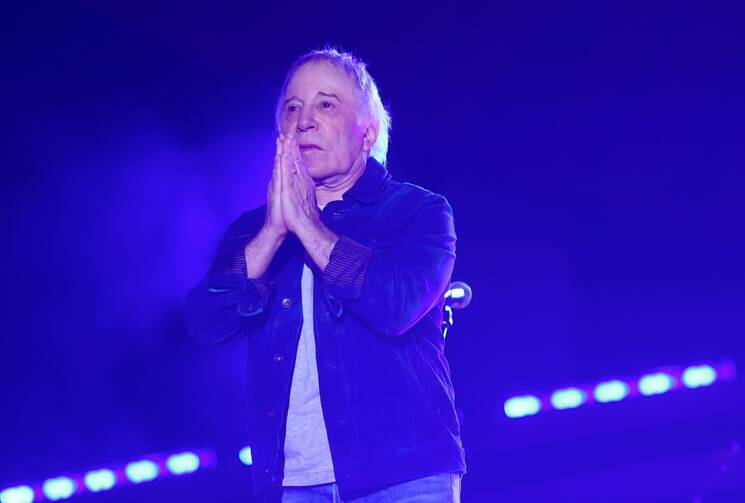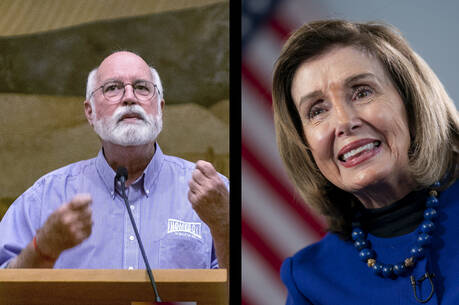Most Americans understand the Bible as a rulebook for how to live your life, but fewer think of it as a hymnal. Yet the long history of American—mostly Protestant—hymnody, set to the cadence of the King James Bible, is embedded in our collective religious consciousness. (Think Julia Ward Howe’s “Battle Hymn of the Republic” or “A Mighty Fortress Is Our God.”) From there it moved into folk music, most notably Pete Seeger’s “Turn! Turn! Turn!” and a huge chunk of Bob Dylan’s ever-expanding catalog.
We are living in the twilight age of significant singer-songwriters who have worked in a biblical idiom. Willie Nelson just celebrated his 90th birthday with a two-day series of tribute concerts at the Hollywood Bowl. Bob Dylan turned 82 last month; Paul McCartney will be 81 this month. Paul Simon, another octogenarian songwriter, has just released a new album entitled “Seven Psalms.”
While “Seven Psalms” has an air of finality in terms of this world, it hints at an open door that leads into much larger rooms.
The Psalter is the Bible’s songbook, and tradition attributes most of the Psalms to King David, whom the Bible dubs “the sweet singer of Israel.” And while Paul Simon is not known for a large number of biblically inspired songs (“Bridge Over Troubled Water” being the notable exception), he has touched upon biblical and religious themes before. I refer the reader to “Jonah” from the 1980 LP “One Trick Pony,” or his use of the melody from the old hymn “O Sacred Head Now Wounded” for his 1973 song “American Tune,” or the heartbreaking yet uplifting story of the refugee family who finds shelter in the church from life and death in “The Coast,” from 1990’s transcendent “Rhythm of the Saints.” This list can be easily extended.
“Seven Psalms” is different, though. The entire 33-minute record is one musical piece without pause, and with sparse instrumentation and production, built around minor chords throughout. Its sad and reflective music suits Simon’s wobbly high tenor. John Pareles describes the record as “a last testament” in The New York Times, and while it has an air of finality in terms of this world, it hints at an open door that leads into much larger rooms.
The Psalter, strictly speaking, is not God’s word to us, but rather our words about God, and as such it is rich in metaphors for the divine: rock, tower, light, shepherd, a mother’s comforting breast. Like its namesake, “Seven Psalms” piles up its own imagery for God, encompassing the biblical God of both comfort and destruction:
The Lord is my engineer
The Lord is the earth I ride on
The Lord is the face in the atmosphere
The path I slip and I slide on
The Covid virus is the Lord
The Lord is the ocean rising
The Lord is a terrible swift sword
A simple truth surviving
In this cosmic vision, Simon also sees the Lord in the human world in terms of stewardship, vulnerability and care. One such example is this repeated stanza that the radical priest in “Me and Julio Down by the Schoolyard” would no doubt approve of:
The Lord is a virgin forest
The Lord is a forest ranger
The Lord is a meal for the poorest of the poor
A welcome door to the stranger
But it is the last ten minutes of the record, beginning with the movement entitled “The Sacred Harp,” where “Seven Psalms” takes flight. Here, Simon’s wife, Edie Brickell—a wonderful singer in her own right—joins in counterpoint and harmony as Simon paints a picture of the two of them picking up a hitchhiking, unhoused young couple. The girl says, “We’re refugees of sorts/ From my hometown/ They don’t like different there/ They would have moved us down,” while the boy says nothing, struggling with the unnamed but all-too-common traumatic exclusions that occur in this country. Joining their voices together, Simon and Brickell express the longing for healing that only music can bring:
The sacred harp
|That David played to make his
Songs of praise
We long to hear those strings
That set his heart ablaze
David, the Bible tells us, died a pretty shabby death. Old, frail and bedridden, he imparts instructions to his son Solomon that include orders for the killing of the old king’s enemies that is more reminiscent of “The Godfather” than Holy Writ. Simon’s meditation on death is much more uplifting. The album’s final movement, “Wait,” ends with a conversation between Simon—like David, feeling his age and seeing the end—asking for more time in a lament worthy of the Psalms that express this same poignant request. Brickell responds, speaking in the voice of God, and comforts the old man: “Life is a meteor/ Let your eyes roam/ Heaven is beautiful/ It’s almost like home.”
Almost like home, but not exactly. We will leave something behind, in the love, music, hatred and destruction Simon so powerfully details in this album, whose final words before its beautiful, extended “Amen” is Brickell’s lovely voice as the Heavenly Mother beckoning us all inside at the end of a long day: “Children, get ready; it’s time to come home.”
In antiquity, the Book of Psalms was understood as a fluid collection. The ancient Greek version of the Psalter has come down to us with an extra one at the end, known appropriately as Psalm 151. The Psalms Scroll from Qumran has eight extra poems. The Psalms, in other words, have long made room for more songs. Paul Simon’s brilliant and biblical intertwining of hope, regret, fear and love makes “Seven Psalms” a fitting addition to anyone’s Psalter.








